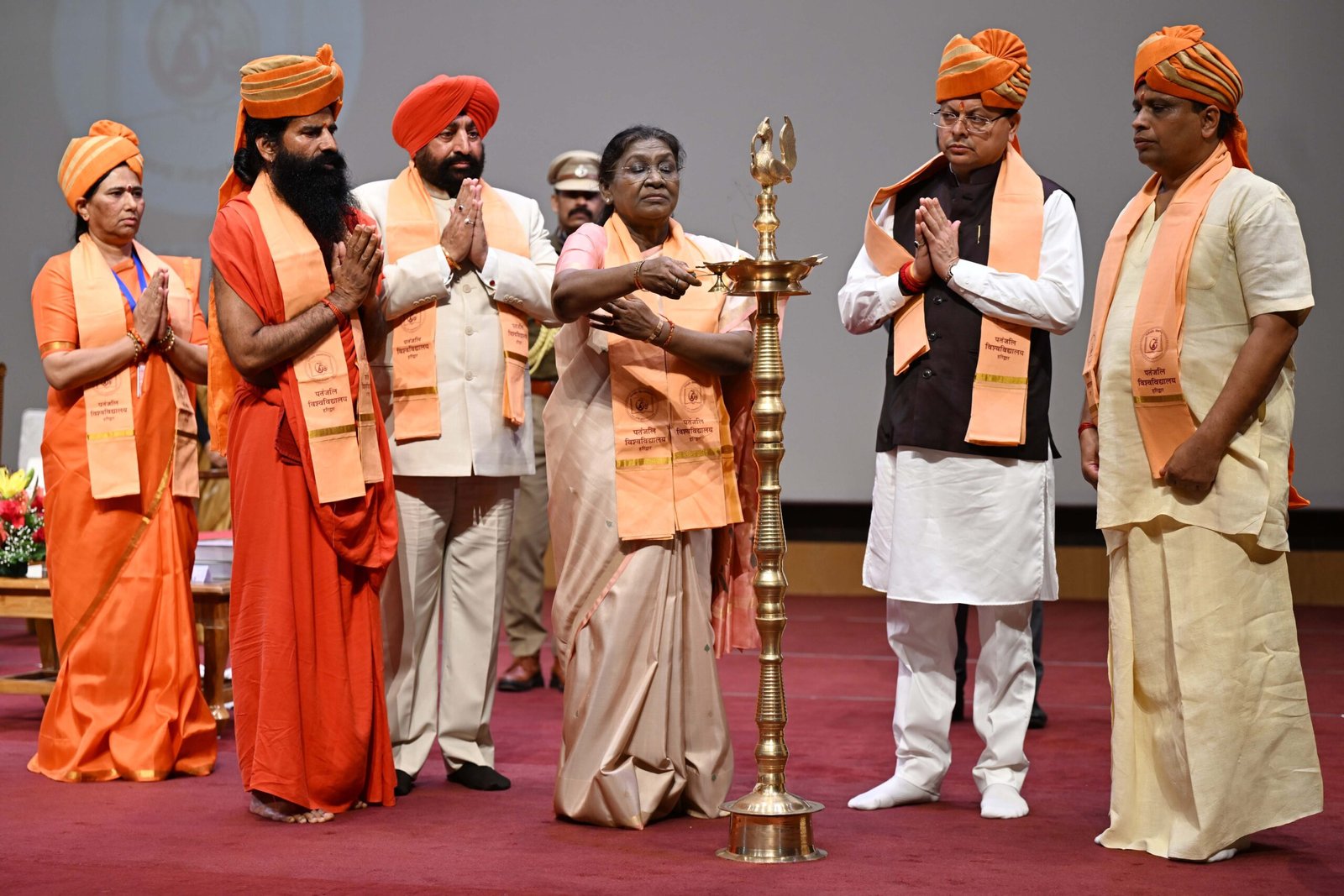President of India Droupadi Murmu attended the second convocation ceremony of the University of Patanjali in Haridwar today. Addressing the graduating students, the President said that the spirit of universal brotherhood, the integration of ancient Vedic knowledge with modern scientific research, and the collective resolve to address global challenges were advancing India’s timeless knowledge tradition in a modern context.
Our correspondent reports that President Murmu began her address by paying tribute to Maharishi Patanjali, the legendary sage who contributed immensely to India’s intellectual and spiritual heritage. She remarked that Maharishi Patanjali removed the impurities of the mind through Yoga, of speech through Grammar, and of the body through Ayurveda, thereby establishing a complete system for human well-being. The President said she was pleased to note that the University of Patanjali was carrying forward this great legacy by making Patanjali’s wisdom accessible to society through education and research.
The President commended the university for advancing studies in Yoga, Ayurveda, and Naturopathy, calling it a commendable effort toward building a healthy and self-reliant India. She said that promoting traditional Indian systems of wellness in an evidence-based and research-oriented framework was essential for creating a balanced and holistic global healthcare model.
Our correspondent adds that President Murmu also appreciated the university’s India-centered educational vision, which combines ancient knowledge with contemporary innovation. She observed that the blending of classical Vedic insights with cutting-edge scientific inquiry exemplified the evolving identity of the Indian education system, which now seeks to merge spirituality, sustainability, and scientific reasoning.
 Addressing the students, the President emphasised that their education must reflect responsibility toward environmental protection and harmonious living with nature. She expressed confidence that graduates of the University of Patanjali would continue to uphold values of compassion, sustainability, and service to humanity while contributing to solutions for pressing global issues such as climate change.
Addressing the students, the President emphasised that their education must reflect responsibility toward environmental protection and harmonious living with nature. She expressed confidence that graduates of the University of Patanjali would continue to uphold values of compassion, sustainability, and service to humanity while contributing to solutions for pressing global issues such as climate change.
The President stated that the wish for universal well-being (Sarve Bhavantu Sukhinah) remains the foundation of India’s cultural ethos. This spirit of collective welfare, she said, leads to social harmony and inclusive development. She urged students to carry this sense of responsibility forward and to apply the values of harmony and unity in their personal and professional lives.
The President observed that nation-building begins with the development of individuals, and the progress of families and society naturally follows. She noted that the University of Patanjali, under its guiding philosophy, has adopted this principle by focusing on individual character development as a means to strengthen society and the nation. She expressed confidence that students of the university would contribute meaningfully to building a healthy, prosperous, and morally strong India.
Our correspondent adds that the convocation ceremony saw the participation of faculty members, students, scholars, and representatives from the fields of yoga, ayurveda, and traditional medicine. Degrees were awarded to graduating students in various disciplines, and the President interacted with medal winners and research scholars. The event also featured a cultural presentation showcasing India’s ancient wisdom and its relevance in modern life.
Concluding her address, President Murmu highlighted the importance of harmony between science and spirituality in today’s world. She said that India’s ancient educational systems viewed knowledge as a means to serve humanity, and that same spirit should guide the nation’s modern institutions. “By nurturing the individual, we nurture families; by strengthening families, we strengthen the nation,” she said, reaffirming her belief that moral education and inner development are the true foundations of progress.
The convocation ceremony at the University of Patanjali reflected the institution’s commitment to blending traditional Indian wisdom with contemporary learning, offering a model for holistic education that aims not only at intellectual excellence but also at spiritual and ethical growth.



























